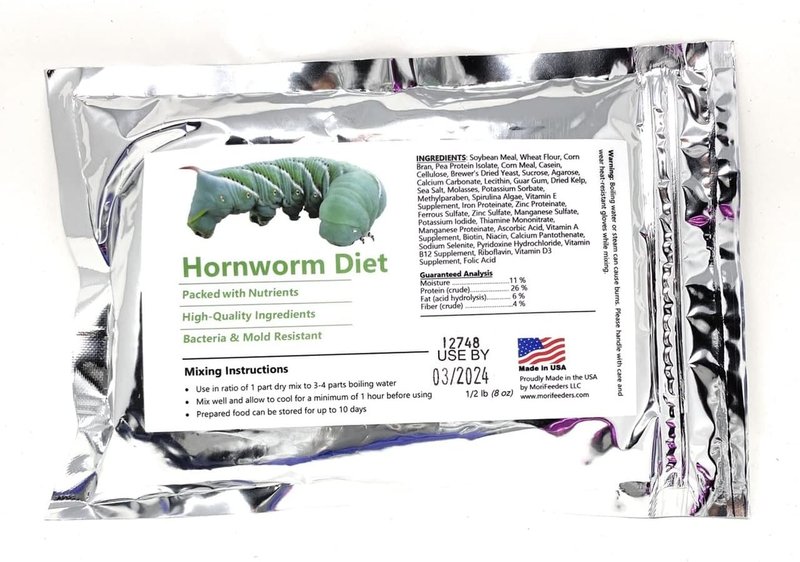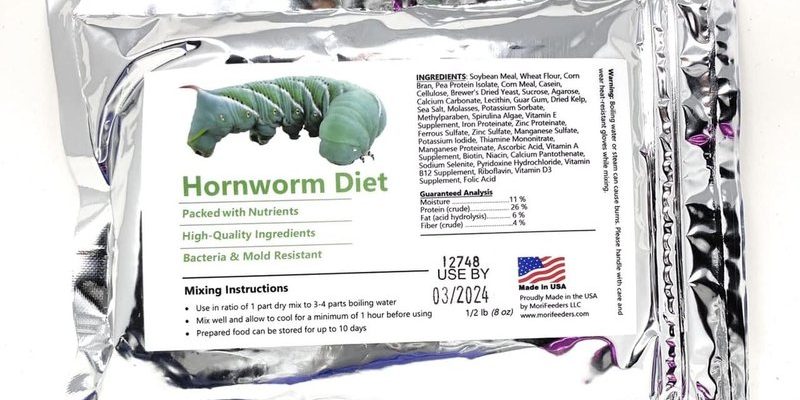
Synthetic diets for insects are becoming more common, especially in controlled environments like labs or farms. They promise consistency and can sometimes even optimize growth rates. But what does that mean for our friend the hornworm? Can these tailored diets support their complex dietary needs? Let’s dive into the world of hornworms and synthetic feeds to uncover the nuances and implications of this dietary shift.
Understanding Hornworm Diets
Hornworms are the larvae of the *Manduca sexta* moth, and their diet primarily consists of tender leaves from plants such as tomato, tobacco, and pepper. They are voracious eaters, and that’s not just for show; their natural diet provides essential nutrients that promote their growth and development. Think of these leaves as a buffet that keeps them healthy and strong.
In the wild, hornworms have adapted to these specific plants, which means that their bodies are tuned to digest these natural materials efficiently. They get not only the calories they need but also vital compounds that help them grow into healthy moths. Now, when we start talking about synthetic diets, we need to consider whether these foods can replicate what nature provides.
The Composition of Synthetic Diets
Synthetic diets for insects, including hornworms, often contain a mix of proteins, carbohydrates, vitamins, and minerals, all manufactured to support growth. These diets aim to simulate the nutritional profile found in the natural food sources hornworms enjoy. It’s kind of like creating a vitamin-packed smoothie to replace that hearty meal—it’s not exactly the same, but it can still be nutritious.
Here’s what to keep in mind about the components:
- Proteins: Essential for growth and development.
- Carbohydrates: Provide energy for those active hornworm days.
- Vitamins and Minerals: Support overall health and metabolic functions.
While formulating these diets, researchers aim to mimic the natural ratios of nutrients hornworms would consume in the wild. However, the question remains: Does a synthetic diet offer the same benefits as fresh leaves?
Benefits of Feeding Hornworms Synthetic Diets
Feeding hornworms synthetic diets can offer several advantages. For one, synthetic diets can be more consistent in quality compared to fresh produce, which can vary based on season and source. This means that every batch of food can be carefully tailored to provide the right nutrients at the right levels, which is crucial for raising hornworms in a commercial setting or for scientific research.
Another benefit is convenience. Synthetic diets can be easier to store and manage, reducing the need for fresh produce that might spoil quickly. Plus, they can be formulated to ensure that hornworms grow rapidly and uniformly, which is particularly important if you’re breeding them for purposes like feeding reptiles or conducting experiments.
Lastly, there’s a potential for cost savings. While the initial investment in synthetic diets might be higher, over time, they can reduce waste and improve growth rates, ultimately lowering the cost of raising hornworms.
Challenges of Synthetic Diets for Hornworms
Despite the benefits, there are also challenges to consider. One significant issue is palatability. Honestly, if hornworms don’t like the taste of a synthetic diet, they simply won’t eat it. Imagine trying to get a toddler to eat their vegetables—if it doesn’t taste good, it won’t happen!
Additionally, the nutritional balance must be spot on. If the synthetic diet lacks specific nutrients that fresh leaves provide, it could lead to health problems for the hornworms. You might see issues like stunted growth or poor development, which is the last thing you want if you’re raising them for any purpose.
Lastly, there are still questions regarding the long-term effects of synthetic diets. Researchers are still exploring how these diets impact the overall health and behavior of hornworms compared to their natural diet.
Comparing Synthetic and Natural Diets
When it comes to choosing between a synthetic diet and natural leaves for hornworms, it’s a bit like weighing the pros and cons of fast food versus home-cooked meals. Fast food is convenient and consistent, but home-cooked meals often offer better nutrition tailored to your needs.
If you’re breeding hornworms for a quick turnaround, synthetic diets might be the way to go. They can ensure uniform size and quicker growth rates. On the other hand, if you’re looking for the healthiest hornworms that might turn into vibrant moths, feeding them fresh leaves could be the best choice, even if it takes a bit more effort.
Here’s a quick comparison:
| Feature | Synthetic Diet | Natural Diet |
|---|---|---|
| Consistency | High | Varies |
| Storage | Easy | Subject to spoilage |
| Palatability | May vary | Generally high |
| Nutritional Balance | Customizable | Naturally varied |
Real-World Applications and Considerations
So, when are synthetic diets actually used in the real world? They are commonly used in commercial insect farming and research laboratories. When a consistent, rapid growth rate is needed, growers often turn to synthetic options. For instance, when raising hornworms for reptile food, a uniform size is crucial to ensure each meal is just right.
In research settings, scientists might prefer synthetic diets to minimize variables when studying hornworm development. This way, they can focus on the impact of specific nutrients or environmental conditions without the chaos of varying fresh food quality.
But, if you’re an enthusiast or a hobbyist, you might want to stick to a natural diet for your hornworms. The joy of watching them grow on fresh leaves can be a fulfilling experience that synthetic diets simply can’t replicate.
Final Thoughts on Feeding Hornworms Synthetic Diets
In the end, whether hornworms can be fed synthetic diets depends on what you’re trying to achieve. If you’re looking for consistency and efficiency, synthetic diets might be the ticket. But if you value the natural process and the connection that comes with raising them on fresh food, then natural diets are likely the better choice.
As we continue to learn more about hornworm nutrition, it’s exciting to see how both approaches can coexist, each serving a different purpose. Whatever you choose, be sure to prioritize their health and well-being, and remember—healthy hornworms make for happy growers!

